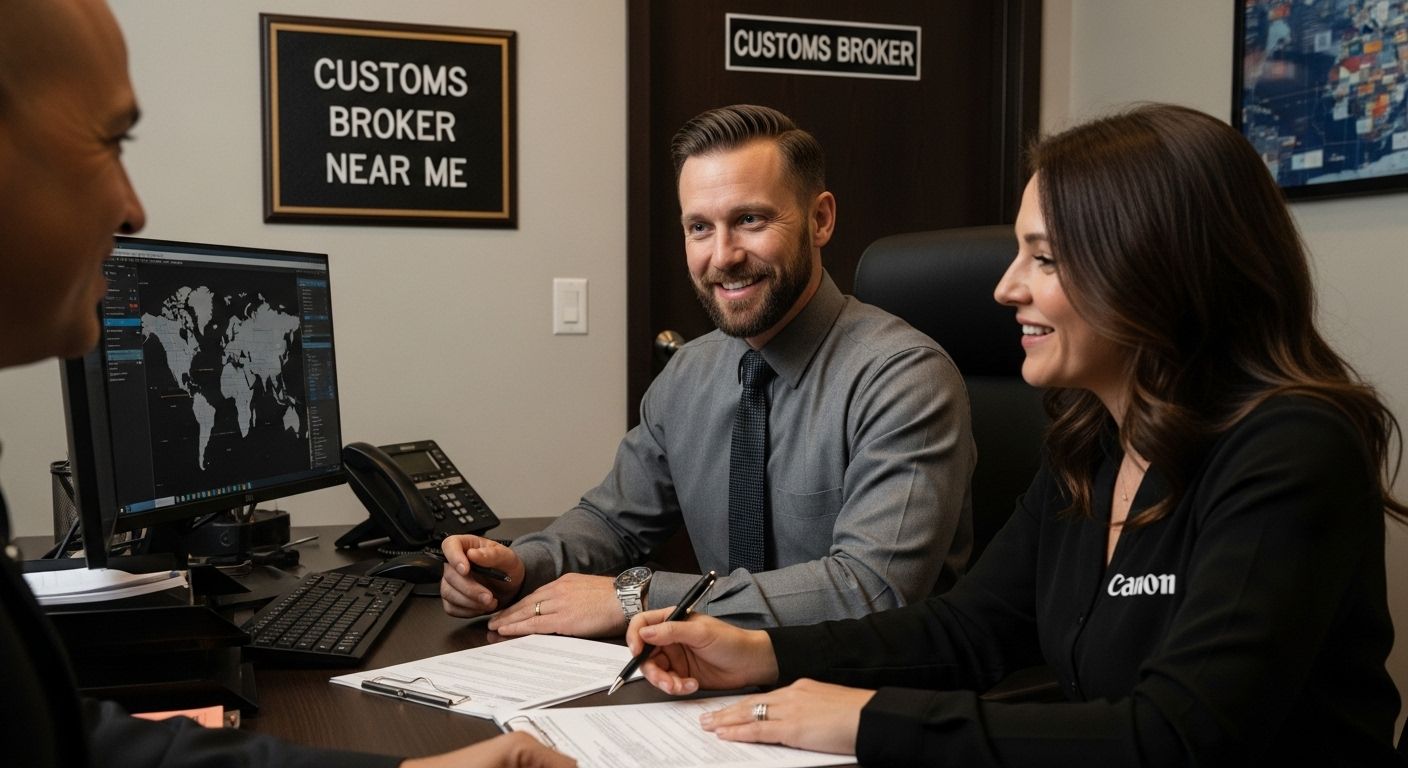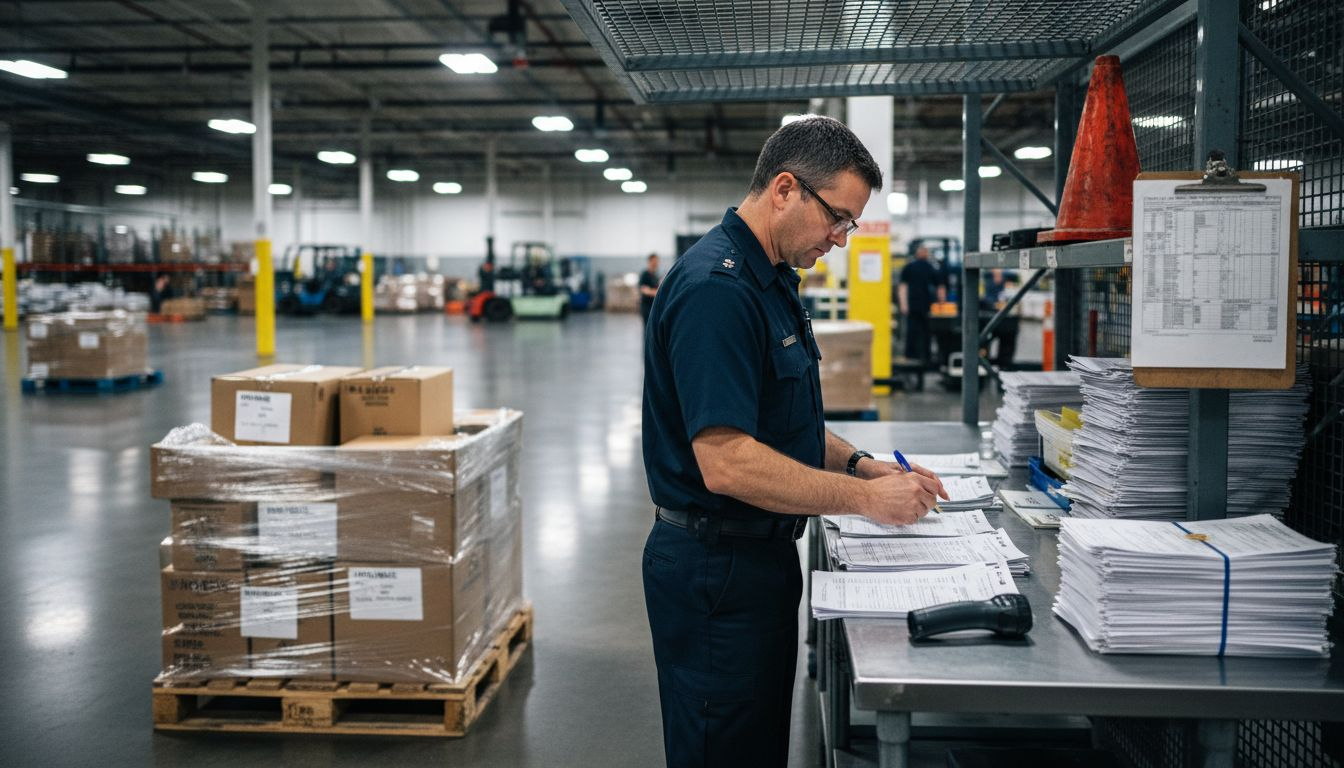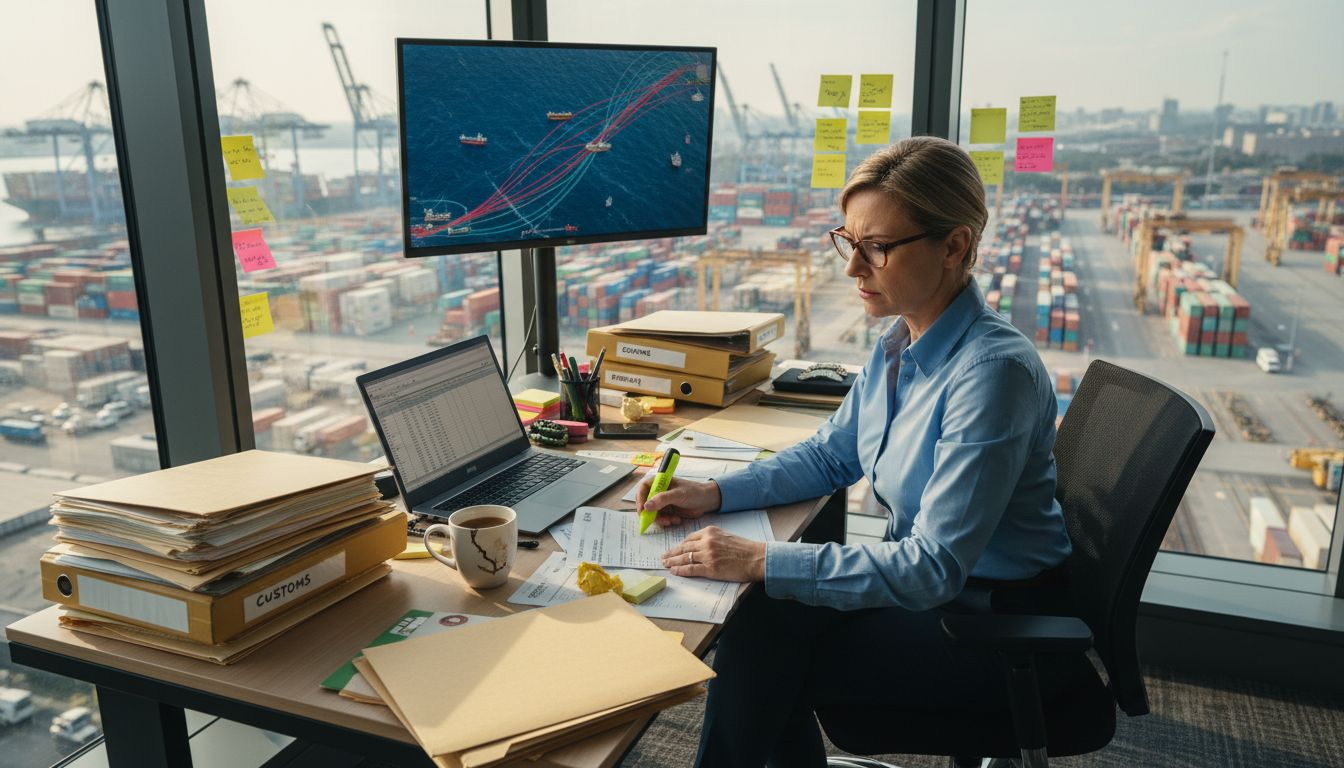Shipping goods across borders sounds straightforward. Yet international trade is tangled with ever-changing rules and pitfalls. Here is the surprise—working with an experienced customs broker can cut import and export costs by up to 15 percent for businesses. Most people picture customs brokers just stamping paperwork, but their real value lies in turning complicated regulations into smooth, profitable operations.
Table of Contents
- What Is A Customs Broker And Their Role In Trade?
- Why Customs Brokers Matter For Importers And Exporters
- How Customs Brokers Facilitate International Shipping
- Key Concepts In Customs Brokerage Explained
- Real-World Impact Of Local Customs Brokers On Business
Quick Summary
| Takeaway | Explanation |
|---|---|
| Customs brokers ensure compliance in trade. | They act as intermediaries, helping businesses navigate customs regulations and avoid legal issues. |
| They manage duties and taxes accurately. | By calculating import duties properly, brokers help prevent financial penalties and shipment delays. |
| Brokers provide strategic trade optimization. | Their expertise can help reduce import/export costs by up to 15% through efficient trade strategies. |
| Continuous education is vital for brokers. | Customs brokers must complete 36 hours of education every three years to stay updated on regulations. |
| Local brokers enhance operational efficiency. | They help businesses minimize risks and streamline compliance, allowing for smoother global operations. |
What is a Customs Broker and Their Role in Trade?
A customs broker is a licensed professional who acts as an intermediary between importers and government customs agencies, facilitating the smooth and compliant movement of goods across international borders. These specialized logistics experts navigate the complex landscape of international trade regulations, ensuring that businesses can efficiently import and export merchandise while adhering to legal requirements.
Core Responsibilities of Customs Brokers
Customs brokers perform critical functions that are essential for international trade operations. Their primary responsibilities include:
- Preparing and submitting accurate customs documentation
- Calculating and managing import duties and taxes
- Interpreting complex customs regulations and trade laws
- Representing clients during customs inspections and clearance processes
- Advising businesses on import and export compliance strategies
Their expertise helps companies avoid potential legal complications, financial penalties, and shipment delays. By understanding the intricacies of customs procedures, brokers provide an invaluable service that streamlines international trade logistics.
Licensing and Professional Standards
Customs brokers must meet rigorous professional standards to operate legally. According to U.S. Customs and Border Protection, licensed brokers are now required to complete 36 hours of continuing education every three years. This mandate ensures that brokers remain current with evolving trade regulations, technological advancements, and global trade compliance requirements.
These professionals typically possess specialized knowledge in areas such as tariff classifications, valuation methods, trade agreements, and specific industry regulations. Their comprehensive understanding allows businesses to navigate the intricate world of international shipping with confidence and precision, minimizing risks and maximizing operational efficiency.
Why Customs Brokers Matter for Importers and Exporters
Customs brokers play a pivotal role in international trade by serving as critical navigators through the complex world of global shipping regulations, tariff classifications, and compliance requirements. For businesses engaged in importing and exporting, these professionals are not just optional service providers but essential partners in maintaining smooth, efficient, and legally compliant international trade operations.
The following table compares core responsibilities, risk mitigation, and strategic benefits customs brokers provide for importers and exporters.
| Aspect | Role of Customs Broker | Impact on Business |
|---|---|---|
| Documentation & Compliance | Prepares accurate customs documentation and ensures regulatory adherence | Avoids shipment delays and legal penalties |
| Duties & Taxes Management | Calculates and manages import duties and taxes | Reduces costs and prevents overpayment |
| Risk Mitigation | Identifies regulatory risks and corrects classification | Minimizes financial and operational risks |
| Strategic Optimization | Leverages trade agreements and optimizes processes | Lowers costs by up to 15% |
| Education & Standards | Maintains current knowledge and licensure | Ensures compliance with evolving laws |
Financial and Operational Risk Mitigation
The financial implications of customs errors can be substantial for businesses. Mistakes in documentation, misclassification of goods, or incorrect duty calculations can result in significant penalties, shipment delays, and potential legal complications. Customs brokers help mitigate these risks by:
- Ensuring precise classification of imported and exported goods
- Calculating accurate duties and taxes
- Identifying potential cost-saving opportunities through trade agreements
- Preventing costly regulatory violations
- Streamlining customs clearance processes
By exploring the nuanced world of international trade compliance, businesses can
transform potential regulatory challenges into strategic advantages.
Strategic Trade Optimization
Beyond risk management, customs brokers provide strategic value by helping businesses optimize their international trade operations. According to Global Trade Management Research, companies working with experienced customs brokers can reduce import and export costs by up to 15% through strategic classification, leveraging trade agreements, and identifying efficient shipping routes.
Their deep understanding of evolving global trade regulations, technological platforms, and international logistics enables businesses to make informed decisions, adapt to changing market conditions, and maintain a competitive edge in the global marketplace. By providing expert guidance and proactive compliance support, customs brokers help companies navigate the intricate landscape of international trade with confidence and strategic insight.
How Customs Brokers Facilitate International Shipping
Customs brokers serve as essential architects of international shipping, transforming complex logistical challenges into seamless, efficient trade operations. Their expertise extends far beyond simple documentation, encompassing a comprehensive approach to navigating the intricate global shipping ecosystem.
Documentation and Compliance Management
At the core of international shipping, customs brokers manage an extensive array of critical documentation and regulatory requirements. Their responsibilities include:
- Preparing precise import and export declarations
- Verifying product classifications and tariff codes
- Ensuring compliance with international trade regulations
- Managing complex customs clearance processes
- Coordinating required permits and licensing documentation
By diving deep into international shipping protocols, these professionals ensure that shipments move smoothly across international borders while maintaining strict adherence to legal standards.
Strategic Shipping Optimization
Beyond paperwork, customs brokers function as strategic partners who optimize shipping logistics. According to International Trade Administration, they play a pivotal role in helping businesses navigate complex international shipping landscapes by providing expert guidance on routing, cost management, and regulatory compliance.
Their comprehensive understanding of global shipping regulations, trade agreements, and emerging technologies enables businesses to minimize shipping delays, reduce unnecessary expenses, and maintain a competitive edge in the international marketplace. By anticipating potential challenges and proactively developing solutions, customs brokers transform shipping from a potential operational burden into a strategic business advantage.
Key Concepts in Customs Brokerage Explained
Customs brokerage is a sophisticated field that requires deep understanding of international trade regulations, complex documentation processes, and intricate legal frameworks. Professionals in this domain must navigate a multifaceted landscape of global shipping requirements, ensuring businesses can move goods across borders efficiently and compliantly.
Essential Terminology and Classifications
Understanding the fundamental language and classifications of customs brokerage is crucial for businesses engaged in international trade. Key concepts include:
Below is a table summarizing essential terminology and key classifications in customs brokerage, making it easier to understand the core concepts referenced throughout the article.
| Term | Definition |
|---|---|
| Harmonized Tariff Schedule (HTS) | A comprehensive system for classifying traded goods |
| Customs Value | The total cost of imported goods used to calculate duties and taxes |
| Preferential Trade Agreements | Special arrangements that reduce or eliminate import duties between specific countries |
| Duty Drawback | A refund of customs duties paid on imported goods that are subsequently exported |
| Free Trade Zones | Designated areas where goods can be imported with reduced or suspended customs regulations |
- Harmonized Tariff Schedule (HTS): A comprehensive system for classifying traded goods
- Customs Value: The total cost of imported goods used to calculate duties and taxes
- Preferential Trade Agreements: Special arrangements that reduce or eliminate import duties between specific countries
- Duty Drawback: A refund of customs duties paid on imported goods that are subsequently exported
- Free Trade Zones: Designated areas where goods can be imported with reduced or suspended customs regulations
Exploring the nuanced world of trade classifications reveals the intricate mechanisms that underpin international shipping logistics.
Regulatory Compliance and Professional Standards
Customs brokers operate within a stringent regulatory environment that demands continuous learning and adaptation. According to U.S. Customs and Border Protection, licensed brokers must now complete 36 hours of continuing education every three years. This requirement ensures that professionals remain current with evolving trade laws, technological advancements, and global shipping regulations.
These ongoing educational mandates underscore the complexity of customs brokerage and the critical role these professionals play in facilitating smooth, legally compliant international trade. By maintaining high professional standards, customs brokers help businesses mitigate risks, optimize shipping strategies, and navigate the increasingly complex global trade landscape.
Real-World Impact of Local Customs Brokers on Business
Customs brokers are transformative partners for businesses engaged in international trade, providing critical support that extends far beyond basic documentation and regulatory compliance. Their localized expertise and strategic insights can significantly impact a company’s operational efficiency, financial performance, and competitive positioning in the global marketplace.
Cost Management and Financial Optimization
Local customs brokers deliver substantial financial benefits by helping businesses strategically navigate complex international trade regulations. Their impact on cost management includes:
- Identifying potential duty reduction opportunities
- Minimizing unnecessary shipping and customs penalties
- Analyzing and optimizing product classification strategies
- Leveraging preferential trade agreements
- Implementing efficient import/export workflows
Uncovering strategic approaches to international trade can unlock significant financial advantages for businesses of all sizes.
Risk Mitigation and Operational Efficiency
According to the U.S. Bureau of Labor Statistics, customs brokers play a pivotal role in helping businesses navigate the intricate landscape of international shipping regulations. By providing localized expertise, they help companies proactively address potential compliance challenges, reduce shipping delays, and maintain smooth operational continuity.
These professionals serve as critical strategic partners, translating complex regulatory requirements into actionable business strategies.

Their deep understanding of local and international trade regulations enables businesses to confidently expand their global reach, minimize operational risks, and create more predictable and efficient international trade processes.

Simplify Your Customs Experience with Local Experts
Tired of navigating confusing customs documentation and ever-changing regulations on your own? If the article “Understanding Customs Broker Near Me: What You Need to Know” hit home, you already know how crucial local expertise and hands-on support are for avoiding shipment delays, unexpected penalties, and compliance headaches. At Worldwide Express, Inc., our team of licensed customs brokers combines deep knowledge of harmonized tariff schedules, duty calculations, and import/export regulations, so you never have to second-guess the next step in your international shipping process. Need more insight on the fundamentals? Explore our resources in the Uncategorized – Worldwide Express, Inc. section for the latest tips on customs and compliance.

Stop letting complicated customs hurdles block your business growth. Connect with us at https://worldwideexpress.com now and discover a partner who takes care of every detail, streamlines cross-border shipping, and gives you peace of mind. Request a consultation today to see how smooth international trade can be with the right local customs broker by your side.
Frequently Asked Questions
What is a customs broker?
A customs broker is a licensed professional who acts as an intermediary between importers and government customs agencies, ensuring the compliant movement of goods across international borders.
Why do I need a customs broker?
A customs broker is essential for navigating complex international trade regulations, managing import duties, and ensuring that your shipments are in compliance with legal requirements, helping you avoid delays and penalties.
How do customs brokers help with international shipping?
Customs brokers facilitate international shipping by preparing necessary documentation, ensuring compliance with regulations, optimizing shipping logistics, and representing clients during customs inspections and clearance processes.
What qualifications should I look for in a customs broker?
Look for a customs broker who is licensed and has a strong understanding of international trade laws, tariff classifications, and compliance strategies. Additionally, ensure they have experience in your specific industry and are up-to-date with current regulations.






